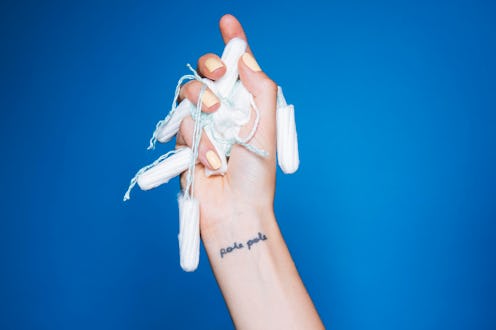No allergy is fun, but being allergic to tampons and pads is a nightmare on a whole new level. As with many other allergies, there's usually an itchy, painful red rash involved — except it's on your nether regions. It may not be as obvious as you might think at first, but the good news is that you're definitely not alone, says Dr. Gail King, MD, FACOG, author of Legs Up! The Ultimate Troubleshooting Guide for Your Vagina, in an interview with Bustle. Even if you may sometimes feel like you're the only one having these problems (a sense of isolation which may or may not have to do with the fact that our society seems to want to keep a lid on any conversation related to reproductive and women's health), it's really not just you.
I've used a particular type of pads ever since I started my period at the age of 13, but it wasn't until a few months ago that I realized the regular itching I experienced during my period probably wasn't normal. And then, what started out as a simple itch during a period that lasted longer than usual blew up into the most uncomfortable, painful prickling on my vulva that I didn't even know was possible.
I tried taking a nice, warm shower, to no avail. It was a bizarre experience, particularly because I've never thought of myself as having sensitive skin, so an allergy didn't even cross my mind until I decided to apply topical cream and start using all-cotton pads from the local drugstore. The itchy, red rash finally faded after a few days.
To those of you who've had similar experiences, I totally get it. Here's what you should know if you're tired of playing host to red sand dunes:
1. You May Be Allergic For Various Reasons
Most of the time, women aren't allergic to just one or two ingredients in whatever they're using. "Tampons and pads are highly processed products. They may have cotton, they may have other synthetic fibers but all of them are processed and sterilized with chemicals," King says. For instance, one chemical often used to give paper towels, toilet paper, and pads their white color can lead to common allergic reactions in the vaginal area, a moist environment that readily absorbs substances into the skin.
2. There Are Plenty of Alternatives
Besides the different brands that produce unscented, hypoallergenic, and/or 100 percent cotton menstrual products, you could also try menstrual cups, such as the Diva Cup, which are becoming more common. King says it takes some trial and error to figure out what works best for you. Some women only have to switch brands, while others may end up having to change the types of products they use altogether.
And if you are adamant about sticking with pads in particular, go for unbleached, wingless pads made with organically grown cotton, according to The V Book: A Doctor's Guide to Complete Vulvovaginal Health by Elizabeth Stewart.
4. Visit The OBGYN To Eliminate Other Issues
"It's important to go ahead and get a gynecologist to do a thorough evaluation, because sometimes it's not really just an allergy," King says. "We want to make sure we're not dealing with a bacterial overgrowth or pH imbalance." There is a little-known condition called lactobacillosis that actually causes irritation, burning, pain during sex, redness, itchiness and/or swelling — sound familiar?
5. Change That Tampon Or Pad Regularly
A lot of allergies can be related to the fragrances found in certain menstrual products. You may think scented pads and tampons help keep the vagina smelling fresh, but the best thing to do is to actually change those products often. Women who have a lighter flow may not think it's necessary, but King recommends changing your pad or tampon at least once every 12 hours, if not more frequently.
6. Allergies Can Surface Later, Rather Than In Childhood
Most people who are sensitive to such products are most likely predisposed to having allergies, King says. The vast majority of allergies will develop over time. "If you have someone who is bleeding for six months straight and you use a tampon every day, you're going to get irritated by that just because it's extraordinary exposure," she says. (So heads up if you're thinking about getting an IUD.) That long-term exposure becomes cumulative.
7. Just Because The Allergic Reaction Goes Away Doesn't Mean The Allergy Is Gone
OK, so you've changed products and now you're not itching anymore. Sex feels good again. Should you go back to those scented tampons? No. Make sure you're not exposing yourself to whatever got you allergic from then on, because "the more you are exposed to it, the stronger the reaction is going to be," she says. So basically once an allergy has made its debut, chances are it's not going anywhere after that. Great.
But again, there are options, and dealing with a tampon or pad allergy is just like dealing with any other kind of allergy: Get it checked out, and treatment will follow. Because no one should have to deal with painful itching, either during their period or not.
Images: Andrew Zaeh for Bustle; Giphy
